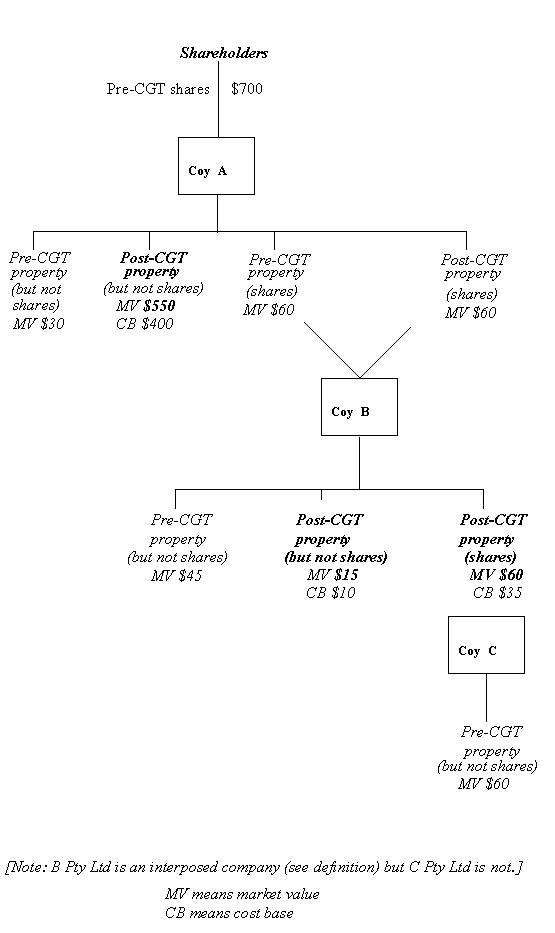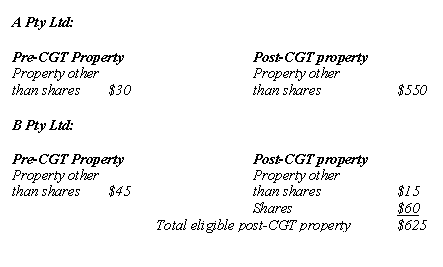Draft Taxation Determination
TD 2000/D16
Income tax: capital gains: if CGT event K6 happens in relation to pre-CGT shares you own in a company, what property do you refer to in calculating your capital gain under subsection 104-230(6) of the Income Tax Assessment Act 1997?
-
Please note that the PDF version is the authorised version of this draft ruling.This document has been Withdrawn.View the Withdrawal notice for this document.
FOI status:
Draft only - for comment| Preamble |
| Draft Taxation Determinations (DTDs) present the preliminary, though considered, views of the Australian Taxation Office. DTDs should not be relied on; only final Taxation Determinations represent authoritative statements by the Australian Taxation Office. |
1. It is post-CGT property owned by the company ('your company') and, as appropriate, post-CGT property owned by all interposed companies or trusts that you refer to in calculating your capital gain under subsection 104-230(6) of the Income Tax Assessment Act 1997. What post-CGT property, however, depends on whether your company is in a single-tier company structure or in a multi-tier company structure.
Single-tier company structure
2. For a single-tier company structure, your capital gain under subsection 104-230(6) is the part of the capital proceeds from your pre-CGT shares which is reasonably attributable to the excess of the market value of your company's eligible post-CGT property over the sum of the cost bases of that property.
Multi-tier company structure
3. For a multi-tier company structure, your capital gain under subsection 104-230(6) is the part of the capital proceeds from your pre-CGT shares which is reasonably attributable to the excess of the market value of:
- (a)
- eligible post-CGT property owned by your company; and
- (b)
- eligible post-CGT property owned by all interposed companies and interposed trusts
over the sum of the cost bases of that property.
4. As explained in the definition of 'eligible post-CGT property' in paragraph 7 of this draft Taxation Determination, in doing the reasonable attribution in subsection 104-230(6) in a multi-tier structure, you refer - for your company and for all interposed companies in the structure - to all post-CGT property including post-CGT shares your company owns in an interposed company but disregarding the same proportion of these shares as the proportion which the market value of post-CGT property of the interposed company bears to the market value of all of its property. If the only property owned by the interposed company is post-CGT property, you disregard the post-CGT shares in the interposed company entirely. If the interposed company owns both pre-CGT property and post-CGT property you only disregard a proportion of the post-CGT shares in the interposed company that is referable to its post-CGT property. In the same manner, for all interposed trusts you refer - for your company and for all interposed trusts in the structure - to any post-CGT interest in an interposed trust but disregarding the same proportion of this interest as the proportion which the market value of post-CGT property of the interposed trust bears to the market value of all of its property.
5. You do not take into account the entire market value of post-CGT shares held in any interposed company (or post-CGT interests in any interposed trust) if the post-CGT property of that interposed company (or trust) in the structure is taken into account directly because - if the market value of the post-CGT shares were also taken into account - there would be a double counting.
6. If your company owns a proportionate interest in an interposed company or trust, and thus your company owns a proportionate interest in post-CGT property of the interposed company or trust, this is taken into account in doing the reasonable attribution.
Note 1:
7. In this draft Taxation Determination:
- 'eligible post-CGT property' means all post-CGT property of your company and of all interposed companies and interposed trusts including:
- (a)
- post-CGT shares in an interposed company but disregarding the same proportion of these shares as the proportion which the market value of post-CGT property of the interposed company bears to the market value of all of its property; and
- (b)
- any post-CGT interest in an interposed trust but disregarding the same proportion of this interest as the proportion which the market value of post-CGT property of the interposed trust bears to the market value of all of its property.
- 'interposed company', in relation to a company (company A), means another company (company B) in which company A owns shares - whether they are pre-CGT shares or post-CGT shares - if company B owns post-CGT property and extends to any company (say, company C) which is an interposed company of an interposed company (for example, company B) if the first mentioned interposed company (company C) owns post-CGT property;
- 'interposed trust', in relation to a company, means a trust (trust A) in which the company owns an interest - whether it is a pre-CGT interest or a post-CGT interest- if the trust owns post-CGT property and extends to any trust (say, trust B) which is an interposed trust of an interposed trust (for example, trust A) if the first mentioned interposed trust (trust B) owns post-CGT property;
- 'post-CGT interest' means an interest acquired on or after 20 September 1985;
- 'post-CGT property' means property (that is not trading stock) acquired on or after 20 September 1985;
- 'post-CGT shares' means shares acquired on or after 20 September 1985;
- 'pre-CGT interest' means an interest acquired before 20 September 1985;
- 'pre-CGT shares' means shares acquired before 20 September 1985; and
- 'your company' means a company in terms of paragraph 104-230(9)(a) in which you own pre-CGT shares.
Note 2:
8. This draft Taxation Determination should be read in conjunction with Taxation Determination TD 2000/D15 which explains what the expression 'property referred to in subsection [104-230](2)' as used in subsection 104-230(6).
Note 3:
9. The views expressed in this draft Taxation Determination in relation to shares in a company apply, adapted as necessary, to an interest in a trust to which section 104-230 applies.
Example
10. Jane Murfett, David Grant and Rachel Rooney dispose of all the issued shares that they own in A Pty Ltd. They acquired the shares before 19 September 1985. At the time of disposal of their shares, A Pty Ltd owns pre-CGT property and post-CGT property (other than shares) and all the issued shares (both pre-CGT and post-CGT shares) in B Pty Ltd. B Pty Ltd owns pre-CGT property, post-CGT property (other than shares) and all the shares (post-CGT shares) in C Pty Ltd. C Pty Ltd owns pre-CGT property.
Your comments
11. This structure is diagrammatically represented below:

12. Jane, David and Rachel calculate their capital gain to be equal to so much of the capital proceeds from the disposal of their shares in A Pty Ltd as may reasonably be attributed to the excess of the market value of:
- (a)
- A Pty Ltd's eligible post-CGT property (excluding the post-CGT shares in B Pty Ltd which is an interposed company) being $550 from the example above; and
- (b)
- B Pty Ltd's eligible post-CGT property (including the post-CGT shares in C Pty Ltd which is not an interposed company) being $15 and $60 respectively from the example above
over the sum of the cost bases of that property.
13. Jane, David and Rachel ignore the market value of the post-CGT shares that A Pty Ltd owns in B Pty Ltd - an interposed company - because there would otherwise be double counting of the market value of those shares and the market value of B Pty Ltd's post-CGT property.
14. The $700 capital proceeds from their shares refer to A Pty Ltd's and B Pty Ltd's eligible post-CGT property of $625 as follows:

15. The capital gain that Jane, David and Rachel each make is $60 being one-third of $180 which is the part of their capital proceeds of $700 reasonably attributable to the excess of the market value of the eligible property ($625) over the sum of the cost bases of that property ($445).
[Note: The formula in draft Taxation Determination TD 2000/D17 produces the same result.]
Your comments
16. We invite you to comment on this Draft Taxation Determination. We are allowing 4 weeks for comments before we finalise the Determination. If you want your comments considered, please provide them to us within this period.
| Comments by Date: | 22 September 2000 |
| Contact Officer: | Carl Dart |
| E-Mail Address: | carl.dart@ato.gov.au |
| Telephone: | (07) 3213 3401 |
| Facsimile: | (07) 3213 3651 |
| Address: |
|
Commissioner of Taxation
23 August 2000
Not previously issued in draft form
References
ATO references:
NO 2000/013025
Related Rulings/Determinations:
TD 2000/D16W
TD 2000/D13
TD 2000/D14
TD 2000/D15
TD 2000/D17
TD 2000/D18
TD 2000/D19
Subject References:
capital gain
capital proceeds
CGT event
CGT event K6
cost base
company
interest
interest in property
interposed company
interposed trust
property
shares
trust
Legislative References:
ITAA 1997 104-230
ITAA 1997 104-230(2)
ITAA 1997 104-230(6)
ITAA 1997 104-230(9)(a)
